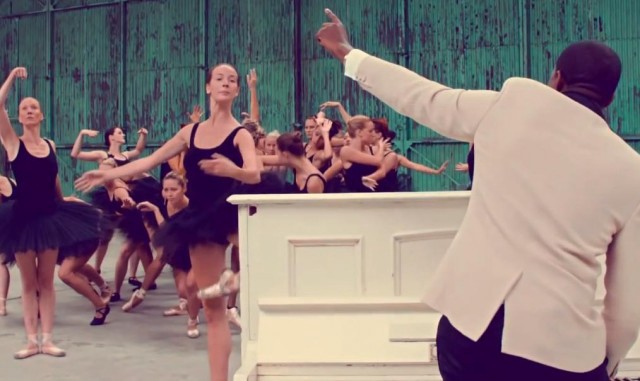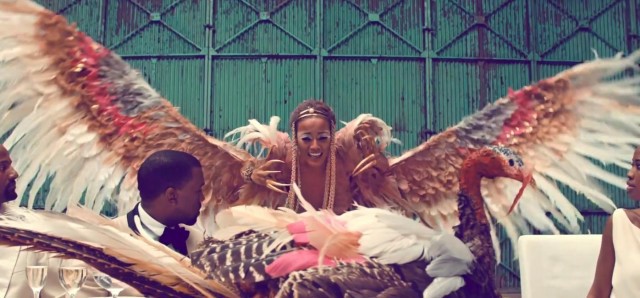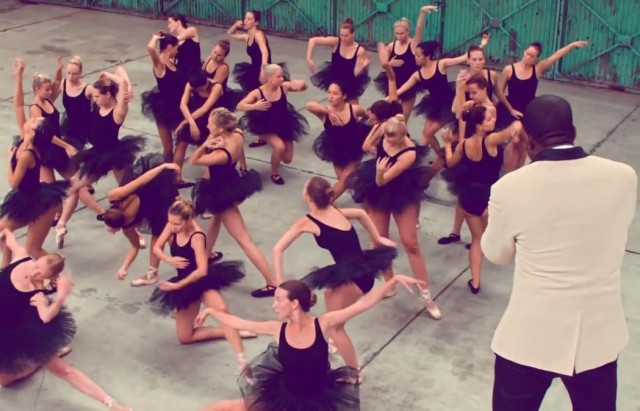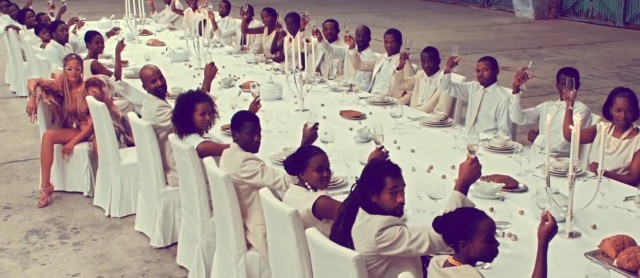Kanye West And His "Thirty White Bitches"

“Yeezus,” the new and almost pathologically anticipated Kanye West album, was leaked online two weeks ago and then, probably out of custom, released legally last week. Upon first listen it reminded me of Nine Inch Nails, Death Grips, and my dad — but not because West now has a two-week-old child with girlfriend Kim Kardashian.
When my father was in undergrad at a small HBCU in the Midwest, he joined the storied black fraternity Kappa Alpha Psi. Fraternity chapters, despite their ethnic and regional differences, will nevertheless always share some DNA, and so it shouldn’t surprise you that my dad’s frat was big on giving people nicknames. Some brothers were called things like “Bumpy” and “Snowman.” My dad, owing to the fact that his girlfriend at the time was a beautiful and extremely fair-skinned black woman with flowing hair, was bestowed the honorific “Brother Jefferson, Keeper of the White Woman.”
To be raised as a man of color in America — especially a black man, and particularly a very dark black man — is to eventually learn that much about you is threatening to the general public. Obvious exposures to that fact include classic racist hits like people crossing the street to avoid you, convenience store owners following you up and down their aisles, and police shooting you for no real reason at all. Less transparent reminders are things like my dad’s frat nickname.
While just a casual, stupid sobriquet on its surface, like many jokes it contained a modicum of honest emotion: Here was a group of young black men, in the Civil Rights Era, no less, who had internalized and then propagated the idea that one true mark of strength a man could demonstrate was his ability to dominate white women. And when there were no white women to reign over, a black woman who looked white would have to suffice.
Four decades later, “Yeezus” is risen, and Pitchfork says the album sparkles with “bold intent.” But if much of Kanye’s latest effort is intrepid, industrial progress, one big swath remains anchored firmly in the past, like a rocket ship heated with a wood-burning stove.

Consider this lyric from “Yeezus”: “Black dick all in your spouse again/ And I know she like chocolate men/ She got more niggas off than Cochran.”
This one, too: “They see a black man with a white woman at the top floor/ They gon’ come to kill King Kong.”
In this one, while “white” isn’t openly stated, it’s rather heavily implied: “Fuck you and your Hampton house/ I fucked your Hampton spouse/ Came on her Hampton blouse/ And in her Hampton mouth.”
If you’re sensing a pattern, I’d imagine that was the artist’s intent.
Kanye West’s ostensible obsession with fucking white women, and what it means to fuck white women, is not unique to his raps, of course. Even 24 years ago, on his track “Pimpin’ Ain’t Easy,” Big Daddy Kane bragged, “I’m tall, dark and handsome and all that junk/ Even white girls be sayin’ ‘Ooh, Kane’s a hunk!’” Neither is West’s fetish a new addition to his craft. In one of his biggest and earliest hits, “Gold Digger,” West warns black women of the disloyalty of their ambitious black men, who will “leave [their] ass for a white girl.” Later, West’s 2010 solo album, “My Beautiful Dark Twisted Fantasy,” included the stick-in-your-head one-liner “Champagne wishes/ Thirty white bitches.” In West’s video for “Monster,” also from “MBDTF,” one scene finds the rapper sitting in bed playing with the lingerie-clad bodies of lifeless white women. There’s no indication as to whether Kanye killed them, but there they are, their light eyes clouded with a milky stillness.
Not-so-recent but not-so-ancient history helps clarify why a black man might be interested in making it widely known that he can and will sleep with white women. In antebellum and then post-Civil War America, the retribution meted out to black men accused of molesting white women — regardless of the validity of the accusations — was often swift and deadly, with suspected rapists being publicly castrated, beaten, burned alive, perhaps all three.

Black boxing champion Jack Johnson was arrested in 1912 for violating the Mann Act, which made it illegal to bring women across state lines for “immoral” purposes. The woman Johnson was transporting was his girlfriend, who would one day be his wife, but Johnson’s white arresting officers reported that she was a prostitute.
In 1955, the murder of Chicago teenager Emmett Till in Mississippi centered largely around Till allegedly making a pass at a white woman in a convenience store, telling her he’d “had” white women before. When the woman told her husband what happened, he and his friends tortured and murdered Till. As they beat him before they killed him, Till’s tormentors dared him to say again that he’d had white women. The 14-year-old Till, reportedly unflinching in the face of certain death, obliged: “You bastards, I’m not afraid of you,” he said. “I’m as good as you are. I’ve ‘had’ white women.”
After an all-white, all-male jury had acquitted them of murdering Till, Till’s killers, Roy Bryant and J.W. Milam, would publicly confess to the crime. In a media interview, Milam would say he had no other option (emphasis mine):
“Well, what else could we do? He was hopeless. … [W]hen a nigger gets close to mentioning sex with a white woman, he’s tired o’ livin’. I’m likely to kill him. Me and my folks fought for this country, and we got some rights. I stood there in that shed and listened to that nigger throw that poison at me, and I just made up my mind. ‘Chicago boy,’ I said, ‘I’m tired of ’em sending your kind down here to stir up trouble. Goddam you, I’m going to make an example of you — just so everybody can know how me and my folks stand.’”
Confronted with the obvious fact that white men thought white women to be their most prized possession, it’s not surprising that some black men began considering it a triumph to bed white ladies, especially in a nation as structurally racist as America. When you strip away a person’s ability to dignify himself through rational means — educational attainment, fulfilling work, etc. — you leave him flailing to dignify himself through irrational means, like buying a certain brand of shoes or sleeping with a certain color of woman.
That impulse gets ugly fast. Former Black Panther Minister of Information Eldridge Cleaver said in some of his earlier writings that he believed raping white women was revolutionary, an “insurrectionary act.” In a similar vein, Amiri Baraka once postulated that taking white women from white men was payback for centuries of inhuman oppression. “[T]he average ofay thinks of the black man as potentially raping every white lady in sight,” he once wrote. “Which is true, in the sense that the black man should want to rob the white man of everything he has.”
Kanye West has never advocated raping anyone. His persistent fixation on conquering white women — the lure of white women, injuring white men via their women, etc. — is troublingly retrograde for a multimillionaire who some consider to be the harbinger of a neo-Black Power movement. It ultimately gives lie to the fact that Kanye sees himself as “a god,” as he claims on Yeezus, or, as he told Jon Caramanica in that winding New York Times interview, that he is “so credible and so influential and so relevant.” I’ve yet to see a black man who is truly confident in his human worth and his power spend time crowing about ejaculating onto white chicks. What’s more, what does it yield West in the end? As Kiese Laymon askedthe other day: “Do you think the white men who run these corporations you’re critiquing really give a fuck about you dissing, fucking, fisting, choking white women?”

That is perhaps the saddest thing about my father’s frat nickname, even worse than its inherent misogyny and colorism: Despite its veneer of showy, chest-thumping masculinity, in reality it was bereft of any power at all. It was a put-on for him and his friends to joke about in order feel authoritative from within the confines of their small black college, safely away from white men with guns who would kill them were they to say such things in front of them, or, worse still, within earshot of their white daughters.
Tales of dalliances with white women were certainly bereft of power when Emmett Till tried them out to impress his Mississippi friends with his northern cosmopolitanism. Yes, his boasting prompted a violent rise from a small southern community, which is a certain kind of power. But in the end it was two white men who killed him, beat the case thanks to a jury of their white male peers, and then spoke openly about killing him with no repercussions whatsoever. That’s power.

Cord Jefferson is the west coast editor of Gawker. Stills from the Kanye West film Runaway.
